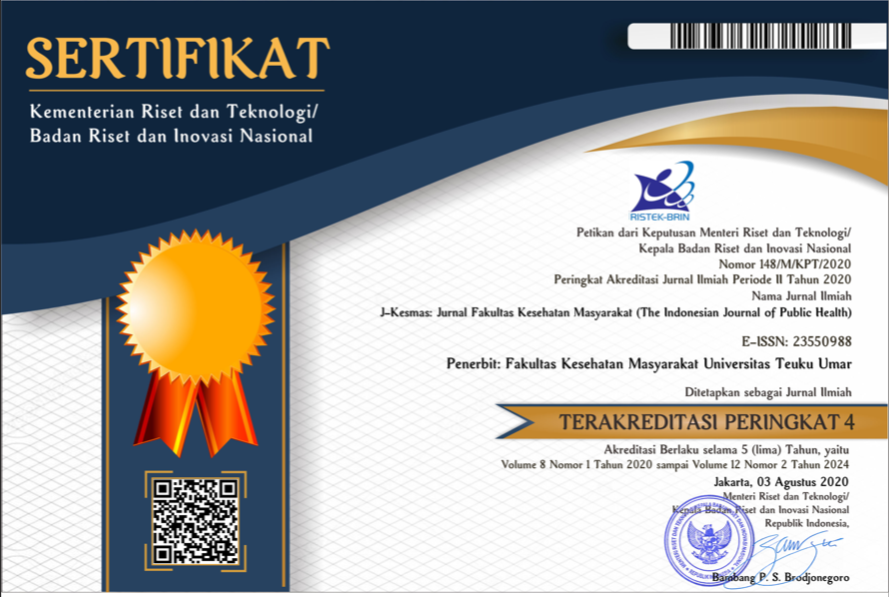Determinants of Multivitamin Supplement Consumption in College Students During The Covid-19 Pandemic
Abstract
Full Text:
PDFReferences
Aiswarya, A., & Bhagya, D. (2021). Effect of Covid 19 lockdown on the lifestyle and dietary diversity of women handloom workers. Clinical Epidemiology and Global Health, 12(100856).
Aldwihi, L. A., Khan, S. I., Alamri, F. F., Alruthia, Y., Alqahtani, F., Fantoukh, O. I., Assiri, A., & Almohammed, O. A. (2021). Patients’ behavior regarding dietary or herbal supplements before and during covid-19 in Saudi Arabia. International Journal of Environmental Research and Public Health, 18(10). https://doi.org/10.3390/ijerph18105086
Alfawaz, H., Khan, N., Alfaifi, A., Shahrani, F. M., Al Tameem, H. M., Al Otaibi, S. F., Abudigin, W. I., Al-Shayaa, M. S., Al-Ghanim, S. A., & Al-Daghri, N. M. (2017). Prevalence of dietary supplement use and associated factors among female college students in Saudi Arabia. BMC Women’s Health, 17(1), 1–7. https://doi.org/10.1186/s12905-017-0475-y
Antari, N. P. U., Dewi, N. P. L. Y., Saputra, I. W. M., Prascitasari, N. A., Arkhania, N. P. A. D., Aswindari, N. N. Z., Juliari, N. P. H., Andarista, N. K. N., Kosalawa, A. A. N. D., Jayanti, N. K. A., Lestari, M. D., & Sangging, I. G. B. (2021). Korelasi Antara Pemahaman Covid-19 Dan Penggunaan Suplemen, Mahasiswa Fakultas Farmasi Universitas Mahasaraswati Denpasar. Jurnal Ilmiah Medicamento, 7(1), 1–7. https://doi.org/10.36733/medicamento.v7i1.1029
Bagheri, M., Haghollahi, F., Shariat, M., Jafarabadi, M., Aryamloo, P., & Rezayof, E. (2020). Supplement Usage Pattern in a Group of COVID- 19 Patients in Tehran. Journal of Family & Reproductive Health, 14(3), 158–165. https://doi.org/10.18502/jfrh.v14i3.4668
Brown, A. C. (2017). An overview of herb and dietary supplement efficacy, safety and government regulations in the United States with suggested improvements. Part 1 of 5 series. Food and Chemical Toxicology, 107, 449–471. https://doi.org/10.1016/j.fct.2016.11.001
Chandrasekaran, B., & Fernandes, S. (2020). Since January 2020 Elsevier has created a COVID-19 resource centre with free information in English and Mandarin on the novel coronavirus . The COVID-19 resource centre is hosted on Elsevier Connect , the company ’ s public news and information website . Diabetes Metab Syndr., 14(4)(January), 337–339.
Craig, T. K. J., Shepherd, G., Rinaldi, M., Smith, J., Carr, S., Preston, F., & Singh, S. (2014). Vocational rehabilitation in early psychosis: Cluster randomised trial. British Journal of Psychiatry, 205(2), 145–150. https://doi.org/10.1192/bjp.bp.113.136283
Dinas Kesehatan Jawa Timur. (2021, August 10). JATIM TANGGAP COVID-19. Infocovid19. https://infocovid19.jatimprov.go.id/
Ioannou, G. N., Locke, E., Green, P., Berry, K., O’Hare, A. M., Shah, J. A., Crothers, K., Eastment, M. C., Dominitz, J. A., & Fan, V. S. (2020). Risk Factors for Hospitalization, Mechanical Ventilation, or Death among 10131 US Veterans with SARS-CoV-2 Infection. JAMA Network Open, 3(9), 1–18. https://doi.org/10.1001/jamanetworkopen.2020.22310
Kamphuis, C. B. M., Giskes, K., de Bruijn, G.-J., Wendel-Vos, W., Brug, J., & van Lenthe, F. J. (2006). Environmental determinants of fruit and vegetable consumption among adults: a systematic review. The British Journal of Nutrition, 96(4), 620–635. https://doi.org/10.1079/BJN20061896
Kaya, S., Uzdil, Z., & Cakiroǧlu, F. P. (2021). Evaluation of the effects of fear and anxiety on nutrition during the COVID-19 pandemic in Turkey. Public Health Nutrition, 24(2), 282–289. https://doi.org/10.1017/S1368980020003845
Kundari, N. F., Hanifah, W., Azzahra, G. A., Islam, N. R. Q., & Nisa, H. (2020). Hubungan Dukungan Sosial dan Keterpaparan Media Sosial terhadap Perilaku Pencegahan COVID-19 pada Komunitas Wilayah Jabodetabek Tahun 2020. Media Penelitian Dan Pengembangan Kesehatan, 30(4), 281–294. https://doi.org/10.22435/mpk.v30i4.3463
Lidia, K., Levina, E., Setianingrum, S., Folamauk, C., Riwu, M., Lidesna, A., & Amat, S. (2020). Peningkatan Kesehatan dengan Suplemen dan Gizi Seimbang di Era Pandemi Covid-19. Jurnal Lembaga Pengabdian Kepada Masyarakat Undana, 14(2), 63–68. http://ejurnal.undana.ac.id/jlppm/article/view/3445
Lieberman, H. R., Marriott, B. P., Williams, C., Judelson, D. A., Glickman, E. L., Geiselman, P. J., Dotson, L., & Mahoney, C. R. (2015). Patterns of dietary supplement use among college students. Clinical Nutrition, 34(5), 976–985. https://doi.org/10.1016/j.clnu.2014.10.010
Mukti, A. W. (2020). Hubungan Pengetahuan terhadap Perilaku Penggunaan Suplemen Kesehatan Warga Kebonsari Surabaya di Masa Pandemi Covid-19. FARMASIS: Jurnal Sains Farmasi, 1(1), 20–25. http://jurnal.unipasby.ac.id/index.php/farmasis/article/view/2656
Natalia, R. N., Malinti, E., & Elon, Y. (2020). Tingkat Pengetahuan Dan Kesiapsiagaan Remaja Dalam Menghadapi Wabah Covid-19. Jurnal Ilmiah Kesehatan Diagnosis, 15(2), 2302–2531. http://180.178.93.169/index.php/jikd/article/view/203
Prasetyaningtyas, W. E., Nasri, W. O. L. A., & Amalianita, B. (2020). Self-report on the occurrence of insomnia and the habit of taking multivitamins against academic stress among students in the early period of COVID-19 pandemic. Konselor, 9(2), 81. https://doi.org/10.24036/0202092110553-0-00
Riskitasari, A., Kasiati, K., & Fatmaningrum, W. (2021). Hubungan Pengetahuan, Sikap, Kualitas Kie, Dan Dukungan Suami Terhadap Tingkat Konsumsi Vitamin a Pada Ibu Nifas. Indonesian Midwifery and Health Sciences Journal, 3(4), 311. https://doi.org/10.20473/imhsj.v3i4.2019.311-319
Ruskandi, J. H. (2021). Kecemasan Remaja pada Masa Pandemi Covid-19. Jurnal Penelitian Perawat Profesional, 3(3), 483–492. https://doi.org/10.37287/jppp.v3i3.530
Sorci, G., Faivre, B., & Morand, S. (2020). Explaining among ‑ country variation in COVID ‑ 19 case fatality rate. Scientific Reports, 0123456789, 1–11. https://doi.org/10.1038/s41598-020-75848-2
Widiyawati, W., Yusuf, A., & Rukmini Devy, S. (2021). Developing a vocational social rehabilitation model to increase the independence of the instrumental activity of daily living (ADL) among people with severe mental illness. Journal of Public Health Research, 10, 571–576. https://doi.org/10.4081/jphr.2021.2263
DOI: https://doi.org/10.35308/j-kesmas.v10i2.7568
Refbacks
- There are currently no refbacks.
Managed by Fakultas Kesehatan Masyarakat
Published by Universitas Teuku Umar
Website: http://jurnal.utu.ac.id/jkesmas
Email: jkemas@utu.ac.id 
This work is licensed under a Creative Commons Attribution-ShareAlike 4.0 International License.







.jpg)


